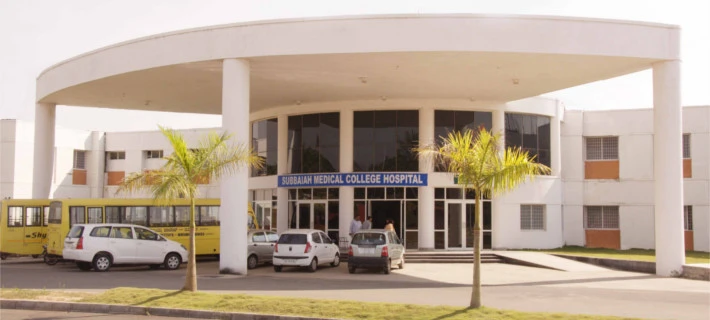Subbaiah Institute of Medical Sciences
Subbaiah Institute of Medical Sciences
Subbaiah Institute of Medical Sciences, which was earlier known as Subbaiah Medical College, is located in the city of Shimoga, Karnataka, India. The institute was created with the objective of providing quality healthcare education, research, and training facilities to the medical fraternity. The tertiary multi-specialty hospital was founded according to Sec.3 of the U.G.C. Act 1956. The mission of the medical institute and hospital is to offer low-cost and high-quality healthcare services. Various medical course programs have been accredited by the National Medical Commission (NMC), Ministry of Health and Family Welfare, Government of India, and Rajiv Gandhi University of Health Sciences (RGUHS). Passing candidates are conferred medical degrees and diplomas from NMC and RGUHS.

Admission Procedure of the Medical College
The university is known for offering courses with a broad spectrum of specializations in Medicine, Surgery, Physiotherapy, Pediatrics, Orthopedics, Obstetrics, and Gynecology, etc. Admission to 5 and a half years’ MBBS course inclusive of one year’s internship period is based on the previous academic records. Scholarship is given to the deserving students on the basis of past academic achievements as well as entrance test marks under the aegis of Subbaiah Trust Foundation. Minimum 50 marks in Biology, Chemistry, Physics and English in higher secondary board examination is a must for the student enrolled in the undergraduate medical programme, and the candidate must clear NEET to apply for undergraduate medical course. The PUC examination should be given the status of recognition by Rajiv Gandhi University of Health Sciences. The school student’s minimum age should be 17 years old by December 31 at the MBBS admission year. The total number of vacant seats is 150.38 with 150 seats are reserved for the residents of Karnataka having appeared the Karnataka Common Entrance Test. The remaining 112 seats are allocated to those candidates who have secured Karnataka Religious Linguistic Minority Professional Colleges Association entrance examination.
Academic and Practical Training Methods
Mentoring in education and training techniques are similar to best practice in any other country. Special attention is given to intensive exposure of the students in any undergraduate and postgraduate course. Rigorous practice with the benchmarks of NMC and Rajiv Gandhi University of Health Sciences is carried out using informative lectures, Cardiopulmonary Resuscitation training, briefings on intensive care medicine and pain, Anesthesiology clinic, training in performance procedural skills in Operation Theatres and Intensive Care Units. Interactive tutorial, case study reports, brainstorming sessions, problem solving techniques training are amongst others integrated in the curriculum. Integrated and inter-departmental conferences and seminars are conducted regularly. Research into current medicine and surgical interventions is also well considered.
Infrastructural Facilities
The college-run hospital is provided with superspecialized, Hi-tech laboratory and 12 operation theaters facilities catering to a broad range of investigations in Pathology, Microbiology, Forensic Medicine and Toxicology, Pharmacology, Orthopedics, Radio Diagnosis, Ophthalmology, Pediatrics, Anaesthesia and others. The college hospital has one of the leading Radiology facilities in the state. Mammography, High-Resolution Color Doppler, Spiral CT Scan, MRI, the most modern version of ultrasound technology, and X-ray devices fill the different hospital departments. House on wheels, language laboratory, well-equipped libraries, computer laboratory, internet access, seminar hall, auditorium, community centre, sports and entertainment complex, hostel and mess, community centre, cultural corner, ATM, and others all are in place to provide dissemination of premier educational services to students.
Faculty and Fees Structure
The teaching faculty consists of highly recognized medical professionals who take part actively in many intensive research activities in modern medicine and present techniques in surgery in the 24 hr/day, 365 day/year college laboratories. Generally, the professors are renowned specialists in their own area, such as General Surgery, Pediatrics, General Medicine, Biochemistry, Dermatology, Community Medicine, Anatomy, Forensic Medicine and Toxicology, Pharmacology, and so on. By way of the department of medicine, there are many research papers/journals in all medical publications nationally and internationally. The annual tuition fee for MBBS is Rs. More or less, 7,00,000, which is also subject to variations depending on the decision of the college authority and Rajiv Gandhi University of Health Sciences.
List of Top Medical Universities/Schools in Abroad
Ivane Javakhishvili Tbilisi State University
King’s College London – GKT School of Medical Education
University of New South Wales (UNSW) Medicine
Vitebsk State Medical University
Kazan State Medical University
Saint Petersburg State Medical University
Sechenov First Moscow State Medical University (MGMU)
Kazakh National Medical University
Pskov State University
Mayo Clinic Alix School of Medicine
Rutgers University
European University

